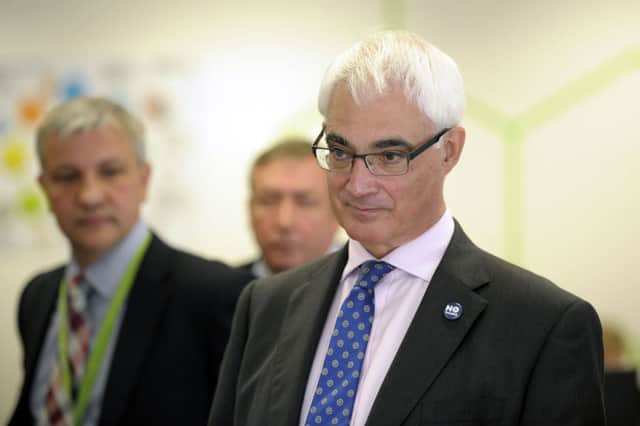Leader: Alistair Darling loss another Labour blow


While he struggled to assert leadership in the Better Together campaign, the loss of such a senior figure with proven Cabinet experience and who helped steady nerves during the financial crisis of 2008-9 will be keenly felt.
His support for Jim Murphy’s candidacy to be Scottish leader will be consolation of sorts after outgoing First Minister Alex Salmond’s blazing attack on Labour – his bitter declaration yesterday that Labour’s association with the Conservatives in the Better Together campaign will not be “forgotten or forgiven for a generation” points to further acrimony ahead.
Advertisement
Hide AdAdvertisement
Hide AdThe Edinburgh Agreement to which Mr Salmond was signatory pledged that the result of the independence referendum would be respected. The First Minister’s fusillade against Labour hardly suggests such a spirit of accord. But the three Unionist parties worked together to campaign for a No vote without any concession to the deep differences between them on other issues – just as the Yes campaign brought together groups on the far left with which official SNP policy was not in accord. The depiction of Scottish Labour being “hand-in-glove” with Conservatives is a crude caricature. That the SNP is now discussing together with the same three Unionist parties a “more powers” agenda can hardly merit a taunt of Mr Salmond’s party being “shoulder-to-shoulder” with them.
Mr Salmond has been fortified in defeat by a substantial increase in SNP membership and by opinion polls showing that the party stands to make major inroads into Labour support in the general election. Labour faces a severe test in rebuilding core support that has been ebbing from it for years – and certainly long before the referendum campaign. The last thing it needs is the loss of Alistair Darling. Mr Salmond can fairly point to the achievements of the SNP in office and argue it has stronger appeal.
But this attack is altogether different. It also lends credence to the view that the referendum result, far from being respected, is instead being used to fuel a furnace of division between the two parties that is in little need of further stoking.
The key divisions that really matter between the two parties are those over the nature and extent of “more powers”. There is the strongest case for co-operation to ensure that a range of extra powers, which successive opinion polls have shown Scots voters to favour, is pursued through the legislative process. Such agreement would be a joint achievement arising from the referendum, and a legacy altogether more worthy and positive than the bitterness currently on offer.
Need for clarity in mortgage charges
Looking for a mortgage? There’s a range of rates and terms on offer. And then there’s the administration fee. Or is that the application fee? Not to be confused with the assessment fee or the reservation fee or the product charge. Oh, and there’s the booking fee.
Confused? You could also be befuddled into a costly mistake. As the Bank of England’s base rate has fallen to its historic 0.5 per cent low, the average arrangement fee cost has almost doubled, from £878 to £1,588. And someone borrowing £100,000 over two years could potentially save around £1,500 taking all set-up fees into account.
Little wonder with so many terms and descriptions that charges can be difficult to understand. Research from consumer group Which? has found that lenders use more than 40 different names to explain fees and charges across the system.
Its survey of more than 2,000 people found that just one in 33 consumers could correctly rank the cost of five two-year fixed-rate mortgage deals. Buying a house is likely to be the biggest single financial decision we will ever make. It’s vital that the associated fees and charges are made as clear and unambiguous as possible and that customers know exactly what they are being charged and why.
Advertisement
Hide AdAdvertisement
Hide AdElsewhere, banks have had to become much more transparent in how they deal with customers. Energy providers have been shamed and PPI has been exposed. Making the charges linked to mortgage application as clear as possible makes good sense.
Which? is calling for Chancellor George Osborne to use his Autumn Statement to make it easier for people to find the best mortgage deal. This deserves support.